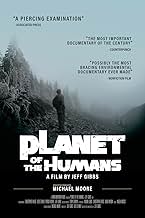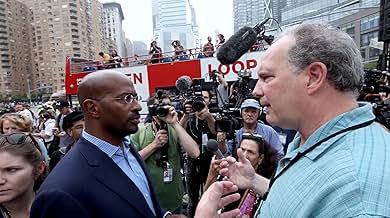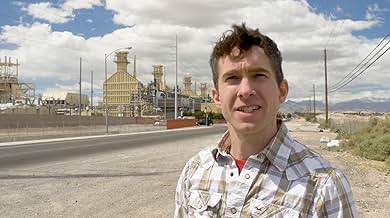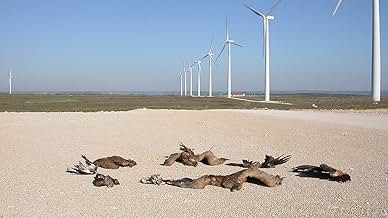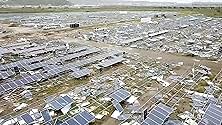Planet of the Humans
- 2019
- 1h 40m
IMDb RATING
6.9/10
3.4K
YOUR RATING
Planet of the Humans takes a harsh look at how the environmental movement has lost the battle through well-meaning but disastrous choices.Planet of the Humans takes a harsh look at how the environmental movement has lost the battle through well-meaning but disastrous choices.Planet of the Humans takes a harsh look at how the environmental movement has lost the battle through well-meaning but disastrous choices.
- Director
- Writer
- All cast & crew
- Production, box office & more at IMDbPro
Featured reviews
We've been had. This film shows the lies and the fantastical thinking behind the notion that solar, wind, and especially, "biomass" are "clean" energy. It's a bitter pill for a lot of people to swallow.
This film gores, no pun intended, many sacred cows, including the most outspoken (and wealthy) environmental activists. Guess who their best friends are? Several well-known organizations are taken down.
I always knew that people back in the 70s were right: We have to use less...we have to live more in harmony with nature...we have to conserve. We have to have fewer children. We live on a planet with finite resources. We cannot continue boundless growth.
My one quibble with the film is that it does not discuss nuclear energy.
This film gores, no pun intended, many sacred cows, including the most outspoken (and wealthy) environmental activists. Guess who their best friends are? Several well-known organizations are taken down.
I always knew that people back in the 70s were right: We have to use less...we have to live more in harmony with nature...we have to conserve. We have to have fewer children. We live on a planet with finite resources. We cannot continue boundless growth.
My one quibble with the film is that it does not discuss nuclear energy.
It's always good to have people question the present sacrements and enviromental solutions for our overconsumption of the natural resources.
But it isn't that well done. I would presume that his budget wasn't so big as the billionaires to state his ideas in this documentary.
The criticism that he gives no solutions is not fair, because these are not easily found when overpopulation and the lifestyle of a majority of the inhabitants of the first world countries with a gigantic carbon footprint are the source of the problem.
Who is willing to really alter their way of life?
And that's a really inconvenient truth.
If the raison d'être of documentaries is to stimulate debate, then I think Jeff Gibbs's Planet of the Humans is a platinum award-winning standard. Brandishing his so-called life-long green credentials early in the piece, he then cynically essentially gives the international green movement both barrels, whilst stridently asserting that renewable energy is just as bad as fossil fuels, high-profile environmentalist proponents and leaders are corrupted by corporate/financial interests and population growth is the great unspoken enemy.
At a foundation level I found one of the greatest weaknesses of Gibbs's argument is that he appears to be using pretty much out of date footage to prop up a lot of his claims and criticisms. It should be noted that by my reckoning only twice during the film are talking head pieces ever given a date stamp and they related to a couple of welcome vintage film warnings about climate change and pollution, 1958 and 1963 respectively.
So then what we find is Gibbs using 2011 footage of a wind farm protest to begin a critique of wind turbines and renewable sources of power in general. To cite another pretty obvious example; a 2010 Michigan launch of the electrically powered Chevy Volt. He criticises it (and vicariously electric cars in general) because it's recharged from a power grid in Michigan dominated by coal and meanwhile overtly seeks to gather some "gotcha moments" from unwary Chevy reps. Solar power and solar arrays in general get the Gibbs treatment too. He tours a very large solar installation in Lansing, Michigan to have an energy rep rather comically report to camera that the panels have an efficiency of a "little less than 8%" and that the array could power only about 10 city homes a year." What the film doesn't say is that the footage is from 2008.
I'm not a science/tech expert, but I would respectfully suggest that throwing the spotlight on such relatively old, out of date, renewable technology examples is an absolute eternity in terms of renewables research and development over the past decade. So on a personal level, while Gibbs is claiming in the film, solar panels are frightfully expensive, have a life of only 10 years and are only rated at 8% efficient. I contrast this with the relatively inexpensive array of 18 panels on my own roof, that have a guaranteed life of 30 years, operate without a booster and are saving me on average about 60 - 65% of my previous power bills. Go figure!
Similarly Gibbs doesn't hold back from picking up the stones to throw at environmental leaders such as Al Gore and Bill McKibben, using edited grabs to push the line that these environmental ikons have sold out to capital interests for pecuniary gain. Again though, the use of footage over a decade old is predominant and to my way of thinking, creates doubt of the validity and authenticity of the questions Gibbs raises.
Ultimately Planet of the Humans is far better at pointing fingers and listing problems, than it is at offering much in the way of solutions. Executive producer Michael Moore confirmed this when being almost brutally honest in suggesting the film sought to "ignite a discussion" on the planet's future more than anything else.
At a foundation level I found one of the greatest weaknesses of Gibbs's argument is that he appears to be using pretty much out of date footage to prop up a lot of his claims and criticisms. It should be noted that by my reckoning only twice during the film are talking head pieces ever given a date stamp and they related to a couple of welcome vintage film warnings about climate change and pollution, 1958 and 1963 respectively.
So then what we find is Gibbs using 2011 footage of a wind farm protest to begin a critique of wind turbines and renewable sources of power in general. To cite another pretty obvious example; a 2010 Michigan launch of the electrically powered Chevy Volt. He criticises it (and vicariously electric cars in general) because it's recharged from a power grid in Michigan dominated by coal and meanwhile overtly seeks to gather some "gotcha moments" from unwary Chevy reps. Solar power and solar arrays in general get the Gibbs treatment too. He tours a very large solar installation in Lansing, Michigan to have an energy rep rather comically report to camera that the panels have an efficiency of a "little less than 8%" and that the array could power only about 10 city homes a year." What the film doesn't say is that the footage is from 2008.
I'm not a science/tech expert, but I would respectfully suggest that throwing the spotlight on such relatively old, out of date, renewable technology examples is an absolute eternity in terms of renewables research and development over the past decade. So on a personal level, while Gibbs is claiming in the film, solar panels are frightfully expensive, have a life of only 10 years and are only rated at 8% efficient. I contrast this with the relatively inexpensive array of 18 panels on my own roof, that have a guaranteed life of 30 years, operate without a booster and are saving me on average about 60 - 65% of my previous power bills. Go figure!
Similarly Gibbs doesn't hold back from picking up the stones to throw at environmental leaders such as Al Gore and Bill McKibben, using edited grabs to push the line that these environmental ikons have sold out to capital interests for pecuniary gain. Again though, the use of footage over a decade old is predominant and to my way of thinking, creates doubt of the validity and authenticity of the questions Gibbs raises.
Ultimately Planet of the Humans is far better at pointing fingers and listing problems, than it is at offering much in the way of solutions. Executive producer Michael Moore confirmed this when being almost brutally honest in suggesting the film sought to "ignite a discussion" on the planet's future more than anything else.
Finally a documentary that finally points out the REAL problem when it comes to climate change: the overpopulation of Earth. Even if every one of the 8 000 000 000 people on Earth would live more sustainably, it would still not be enough to completely save the planet. Have you ever seen the chart that compares the different actions that can be done? Spoiler alert: having one fewer child is 300 times more effective than recycling. I must say though that I still have two problems with the documentary.
First, the documentary says that the overpopulation of Earth is the problem but it doesn't say why nobody accepts the simple solution of making less babies. Is it because of religion? Babies are cute? Having more babies equals success in life? The freedom of having more kids is more important than our planet? Less babies is bad for the economy?
Second, reducing the population (if we ever do it) will take multiple decades. So, what are we going to do about climate change until then? Hydroelectricity was never mentioned nor nuclear. What about public transportation? What about eating less meat? What about taking the plane once every 3-4 years (and staying longer) rather than flying every year for vacation?
First, the documentary says that the overpopulation of Earth is the problem but it doesn't say why nobody accepts the simple solution of making less babies. Is it because of religion? Babies are cute? Having more babies equals success in life? The freedom of having more kids is more important than our planet? Less babies is bad for the economy?
Second, reducing the population (if we ever do it) will take multiple decades. So, what are we going to do about climate change until then? Hydroelectricity was never mentioned nor nuclear. What about public transportation? What about eating less meat? What about taking the plane once every 3-4 years (and staying longer) rather than flying every year for vacation?
The biggest flaw in this film was excluding a discussion of the obvious solution to the problem...Nuclear power. The gen 3 reactors currently in operation are far safer than their earlier predecessors, and future gen 4 reactors should be capable of operating without generating radioactive waste and with zero melt down risk. Gen 4 reactors are projected to be commercial viable as early as 2030. Conversely, the film did an excellent job of demonstrating the folly and impracticality of "green technologies" such as solar and wind.
Did you know
- TriviaIt was released for free for 30 days on YouTube on the 21st of April 2020 (Earth Day 2020).
- Quotes
Narrator: The takeover of the environmental movement by capitalism is now complete. Environmentalists are no longer resisting those with the profit motive, they're collaborating with them.
- ConnectionsFeatured in Outsiders: Episode #5.14 (2020)
- SoundtracksChilled Cream
Blank & Jones
Interpreted by Blank & Jones
Written by Piet Blank, jaspa Jones, Andy Kaufhold
Published by Soundcolours
Produced, arranged and mixed by Piet Blank, jaspa Jones, Andy Kaufhold
(C) NightsHighNoon Studio, Germany for Soundcolours GmbH & Co. KG
Licenced courtesy of Soundcolours GmbH & Co. KG, www.soundcolours.com
ISRC: DEGE91300132
Details
- Release date
- Country of origin
- Official sites
- Language
- Also known as
- Планета людей
- Filming locations
- Lansing, Michigan, USA(Mercantile Way: Chevy Volt exhibition, S Cedar St: solar panels, Michigan State Capitol: students rally for green energy)
- Production companies
- See more company credits at IMDbPro
- Runtime1 hour 40 minutes
- Color
- Aspect ratio
- 1.78 : 1
Contribute to this page
Suggest an edit or add missing content



